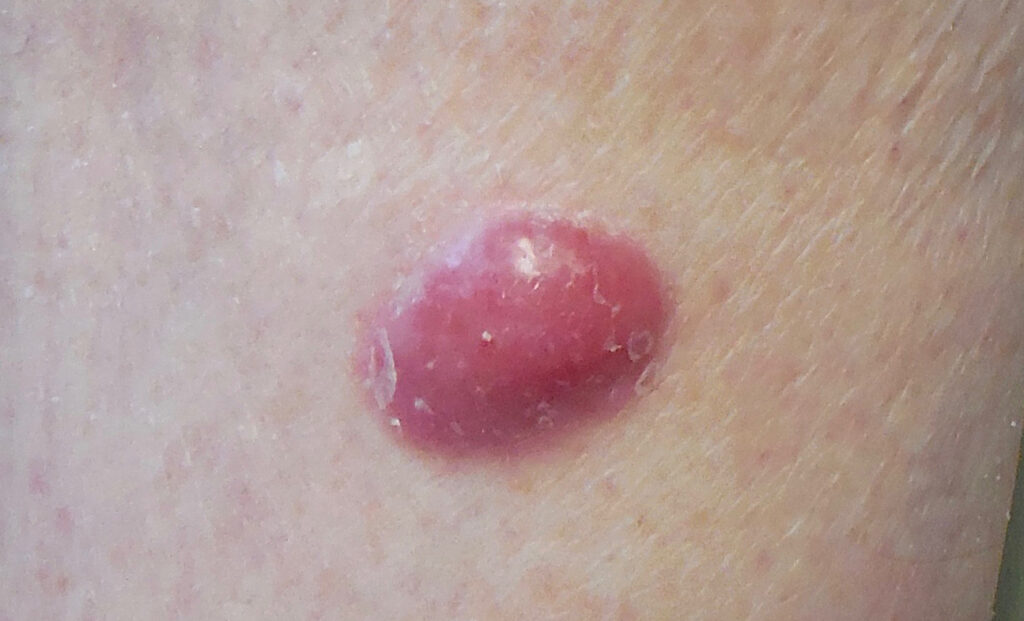Merkel Cell Carcinoma (MCC) might not be as widely recognized as other forms of skin cancer, but its potential impact on health makes it a topic worth exploring. In this post, we’ll delve into what MCC is, who is susceptible to it, its appearance, treatment options, prognosis, and the crucial AEIOU’s associated with this condition.
What is Merkel Cell Carcinoma?
“Merkel Cell Carcinoma is a rare and aggressive type of skin cancer that develops from Merkel cells, which are found in the deepest layer of the epidermis,” says Dr. Adam Mamelak, skin cancer expert in Austin, Texas. These cells are responsible for the sense of touch. While MCC is rare, its incidence has been steadily rising over the years, making understanding it all the more crucial.
Who Gets Merkel Cell Carcinoma?
MCC typically affects older adults, especially those over the age of 50. However, it can occur in individuals of any age, including those with compromised immune systems or a history of excessive sun exposure or tanning bed use. Certain factors, such as a history of other skin cancers or chronic skin conditions, may also increase the risk.
What Does Merkel Cell Carcinoma Look Like?
MCC often appears as a firm, painless nodule or lump on the skin, usually on sun-exposed areas such as the face, neck, or arms. The lesion may be red, purple, or skin-colored and can grow rapidly. Due to its resemblance to other skin conditions, such as cysts or benign tumors, MCC can be challenging to diagnose without a biopsy.
Merkel Cell Polyomavirus
MCC is associated with a virus known as the Merkel cell polyomavirus (MCV). This virus is thought to play a role in the development of MCC, although not all cases of MCC are caused by MCV. The presence of MCV in Merkel cell carcinoma tumors has been linked to improved prognosis in some studies. Patients with MCV-positive MCC tumors tend to have better outcomes compared to those with MCV-negative tumors. MCV-positive MCCs often exhibit fewer genetic mutations and a lower risk of metastasis, contributing to a more favorable prognosis.
How is Merkel Cell Carcinoma Treated?
Treatment for Merkel Cell Carcinoma typically involves a multidisciplinary approach, which may include surgery, radiation therapy, and/or chemotherapy. “More recently, immunotherapy has shown to be an affective treatment of MCC with promising patient outcomes,” says Dr. Mamelak. The choice of treatment depends on various factors, including the size and location of the tumor, the extent of spread, and the patient’s overall health.
Prognosis and Survival Rates:
The prognosis for Merkel Cell Carcinoma can vary widely depending on several factors, including the stage of the cancer at diagnosis, the presence of metastasis, MCV, and the patient’s overall health. However, early detection and prompt treatment are key factors in improving outcomes.
Survival rates for MCC have improved in recent years due to advances in treatment and increased awareness. According to recent studies, the five-year survival rate for localized MCC is approximately 60-80%. However, the prognosis worsens if the cancer has spread to nearby lymph nodes or other organs.
AEIOU’s of Merkel Cell Carcinoma:
The mnemonic AEIOU can help remember the key characteristics associated with Merkel Cell Carcinoma:
– Asymptomatic: MCC often presents as a painless lump or nodule.
– Expanding rapidly: The tumor grows rapidly over a short period.
– Immunosuppression: Individuals with weakened immune systems are at higher risk.
– Older than 50 years: MCC primarily affects older adults.
– Ultraviolet (UV) exposure: Chronic sun exposure or tanning bed use may increase the risk.
Conclusion:
While Merkel Cell Carcinoma is relatively rare, its aggressive nature underscores the importance of early detection and prompt treatment. Understanding the risk factors, symptoms, and treatment options can empower individuals to advocate for their health and seek timely medical attention if needed. By raising awareness and promoting regular skin examinations, we can work towards improving outcomes for those affected by this challenging condition.


